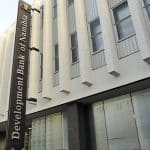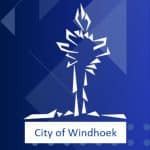

By: Vitalio Angula
In what economists describe as a win for the country, the Development Bank of Namibia (DBN) recently announced its accreditation by the Green Climate Fund (GCF) as a Direct Access Entity under its medium-sized project category.
This milestone makes DBN the first institution in Namibia to acquire this status, qualifying the bank for funding between USD 50 million and USD 250 million.
The accreditation allows DBN to design, submit, and implement its own climate change mitigation and adaptation projects under international standards. It marks a significant shift, enabling Namibia to tap into climate funding independently, without intermediaries, and to accelerate green-growth investments domestically.

Simonis Storm Securities economist, Almandro Jansen
What does this mean for the country?
With Namibia’s Eurobond, issued in 2015, set to mature in October this year, the diversification of the country’s funding sources instills confidence in investors that Namibia is not merely waiting for solutions but is actively building the institutions required to attract capital.
Local economist Almandro Jansen from Simonis Storm Securities says the accreditation is a big win for Namibia’s international reputation and enhances the country’s profile on global markets.
Responding to the announcement made at the 42nd Board Meeting of the GCF held in Port Moresby, Papua New Guinea, from 30 June to 03 July, Jansen said the move shows that Namibia can now access concessional climate-linked financing that softens its risk profile.
“Getting GCF accreditation is not easy; it means DBN has met global standards for financial oversight, environmental sustainability, and social safeguards,” said Jansen.
He added that this reflects well on Namibia’s capacity to manage complex finance and sends a strong message that the country is diversifying its funding sources at a time when external debt is costly and global markets remain volatile.

DBN Chief Marketing and Corporate Affairs Officer, Jerome Mutumba
Pipeline and Disbursement Timeline
The DBN says it is working with government and private partners to accelerate the development and readiness of projects to be funded through the GCF.
According to the bank’s Chief Marketing and Corporate Affairs Officer, Jerome Mutumba, initial concept notes and project frameworks are being finalized, and the bank anticipates that by early to mid-2026, it will have proposals ready for GCF approval.
“Once approved, first disbursements typically follow within six to twelve months after finalizing agreements, due diligence, and contracting. So, projects submitted in Quarter 2 of 2026 could see initial funding by late 2026 or early 2027,” said Mutumba.
“The Integrated Strategic Plan 2024–2029 sets a framework for DBN to pursue green impact investment markets targeting sustainable, climate-aligned opportunities,” he added.
“The aim is to diversify funding sources, draw in global climate capital, and reduce financial costs in Namibia… While the accreditation enables global reach, the primary focus remains domestic—to mobilize funds and develop climate-smart projects across Namibia that align with national development and Paris Agreement goals,” Mutumba explained.
How Development Banks are evolving
Jansen says, “Gone are the days when development banks were mere financiers of roads, bridges, and industrial parks.”
“In a world where climate change is reshaping economies, a bank like DBN has to be part of the solution. The GCF accreditation shows that DBN is stepping up not just to fund development, but to do so in a climate-smart and forward-looking way.”
He further explained that climate finance must align with national development plans and budgets.
“If institutions work in silos, we will miss the opportunity to make GCF funding part of a broader strategy to transform Namibia’s economy,” he added.
Implications for Namibia’s sovereign debt
Mutumba says the accreditation strengthens Namibia’s financial profile and reduces its reliance on costly sovereign borrowing.
“This accreditation supports the deepening of local project finance capacity and unlocks cheaper capital flows that can help Namibia optimize its sovereign debt portfolio and potentially improve Eurobond pricing,” said Mutumba.
Jansen noted that although GCF funds are not intended to pay off debt directly, there is still a worthwhile connection.
“Our Eurobond issued in 2015 matures in October, and the government needs to raise over USD 120 million to cover the outstanding amount. This puts pressure on local markets, reserves, and public confidence,” he said.
“If DBN can fund climate-resilient infrastructure—water, energy, flood prevention—using concessional GCF finance, then the government does not need to borrow as much to finance those same projects. So, while GCF funds don’t go directly to the treasury, they support fiscal health by shifting infrastructure finance off the state’s balance sheet,” Jansen explained.
He added that for bondholders, the accreditation reduces uncertainty: “It signals that we are not just reacting to short-term challenges, but planning for the long haul.”
Jansen concluded that Namibia’s GCF accreditation paves the way for future sustainability-linked or green bond issuances, which are increasingly attractive to global capital markets and provide a stable, long-term development narrative.
Challenges ahead
Jansen warned that markets will only react positively if they see “real projects, with real results, underpinned by real governance.”
“This GCF accreditation is not just a feather in DBN’s cap—it’s a national opportunity,” he said.
He emphasized that this should be seen as the start of a journey, not a destination: “Climate finance isn’t just about projects and pipelines. It’s about shifting how we think about development.”
“Namibia is taking steps to do development differently—in a way that’s sustainable, inclusive, and resilient. But for this to work, we need strong coordination between DBN, the Ministry of Finance, the National Planning Commission, and local governments.”
“Everyone needs to be pulling in the same direction,” Jansen concluded.
About the author

Vitalio is a freelance writer and analyst whose work explores social issues and promotes stronger ties between government and citizens. He advocates for evidence-based policymaking and aspires to become a research consultant focused on using data to inform national development strategies.
The post Development Bank of Namibia secures direct access to Green Climate Fund first appeared on Future Media News.
The post Development Bank of Namibia secures direct access to Green Climate Fund appeared first on Future Media News.























Post comments (0)